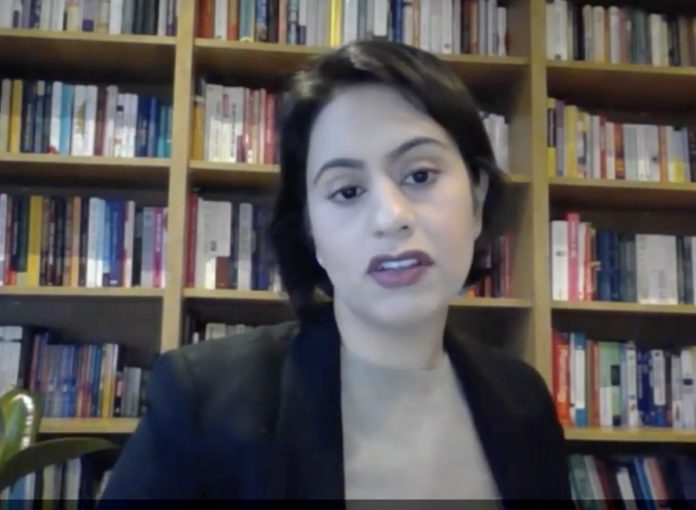Advocacy group CAGE has accused Sara Khan’s Commission for Countering Extremism of weaponising counter-extremism to eradicate dissenting political opinions and clamp down on groups which hold the state to account.
CAGE made the comments after a report by the government body said new laws were needed to tackle the “shocking and dangerous” scale of extremism in the UK.
Muhammad Rabbani, Managing Director of CAGE said: “The CCE… is now calling openly for state sponsored censorship and powers to close groups which challenge this authoritarian drift, through the use of extremely fringe examples, malicious smears and bad-faith interpretations.
“The CCE is a tool of state sanctioned ‘cancellation’. It represents a fringe authoritarian and insidiously Islamophobic lobby within the halls of power, which will seek to forever bolster the Big Brother state through weaponising social crises. They have no interest in resolving the systemic issues facing our society, but rather to simply exploit them for political and ideological expediency.
“CAGE’s work in documenting the Islamophobic and authoritarian nature of counter terrorism powers speaks for itself while the CCE resorts to innuendo against us. Our work is factually accurate and accepted by seasoned academics, UN rapporteurs and experts. The CCE amounts to a clearing house for ‘counter-terror’ advocates, laundering claims from some of the most stridently Islamophobic and censorious organisations in the industry.”
‘Hateful groups operating with impunity’
The report, which was written by retired former counter terrorism officer Sir Mark Rowley and the Commission for Countering Extremism, found that “hateful groups” of all kinds are “operating with impunity” by exploiting gaps between existing hate crime and terrorism legislation.
Subscribe to our newsletter and stay updated on the latest news and updates from around the Muslim world!
It found that such “extremists” were able to glorify terrorism and stir up racial hatred without prosecution. The report named Muslim advocacy group CAGE as one such group.
The report Operating with Impunity – Hateful extremism: The need for a legal framework says that “hateful extremists” are creating a climate conducive to hate crime, terrorism or other violence; or are attempting to erode and even destroy the fundamental rights and freedoms of our democratic society.
The report recommends that:
- A legal and operational framework be created to robustly counter the hateful extremism threat.
- Current offences relating to the stirring up of hatred be expanded and current resources and capability of law enforcement agencies be strengthened.
- Hateful extremism be elevated to be a priority threat alongside terrorism and online child sexual exploitation.
Lead Commissioner Sara Khan said: “Since the 2005 London bombings, one of the long-standing conundrums for the British Government has been how to deal with extremist groups or individuals who are not caught by counter-terrorism legislation, but who are creating a climate that is conducive to terrorism and other societal harms. Previous attempts – such as the 2015 Extremism Bill – were unfocused and rightly criticised because of an inability to ensure the protection of freedom of expression and other civil liberties.
“Our report shows how it is possible to square this circle. We have charted a path the government can take which will ensure protection of freedom of expression while restricting the dangerous activity of hateful extremism.
“Extremist groups whether neo-fascist, neo-Nazi, Islamist or others are able to operate lawfully, freely and with impunity. They are actively radicalising others and are openly propagating for the erosion of our fundamental democratic rights. Their aim is to subvert our democracy. This is a threat to our civilised democratic order, which cannot be taken for granted and requires a robust, necessary and proportionate legal response.
“That is why we are calling on the government to commit to devising a new legal and operational framework to capture the specific activity of hateful extremism. Without such a framework this activity will continue unchallenged and the many harms it is causing in our country will continue to persist and worsen in the next decade.”
Sir Mark Rowley added: “As the national lead for Counter-Terrorism Policing I have witnessed many awful acts of terrorism and violence. However, during the course of conducting this review, I have been shocked and horrified by the ghastliness and volume of hateful extremist materials and behaviour which is lawful in Britain.
“Not only have our laws failed to keep pace with the evolving threat of modern-day extremism, current legal boundaries allow extremists to operate with impunity. They are carefully steering around existing laws in the ways we describe in our report, openly glorifying terrorism, collecting and sharing some of the most violent extremist propaganda, or intentionally stirring up racial or religious hatred against others. Hateful extremism is creating an ever-bigger pool for terrorists to recruit from, as well as increasing violence, hate crime and tensions between and within communities.”






















